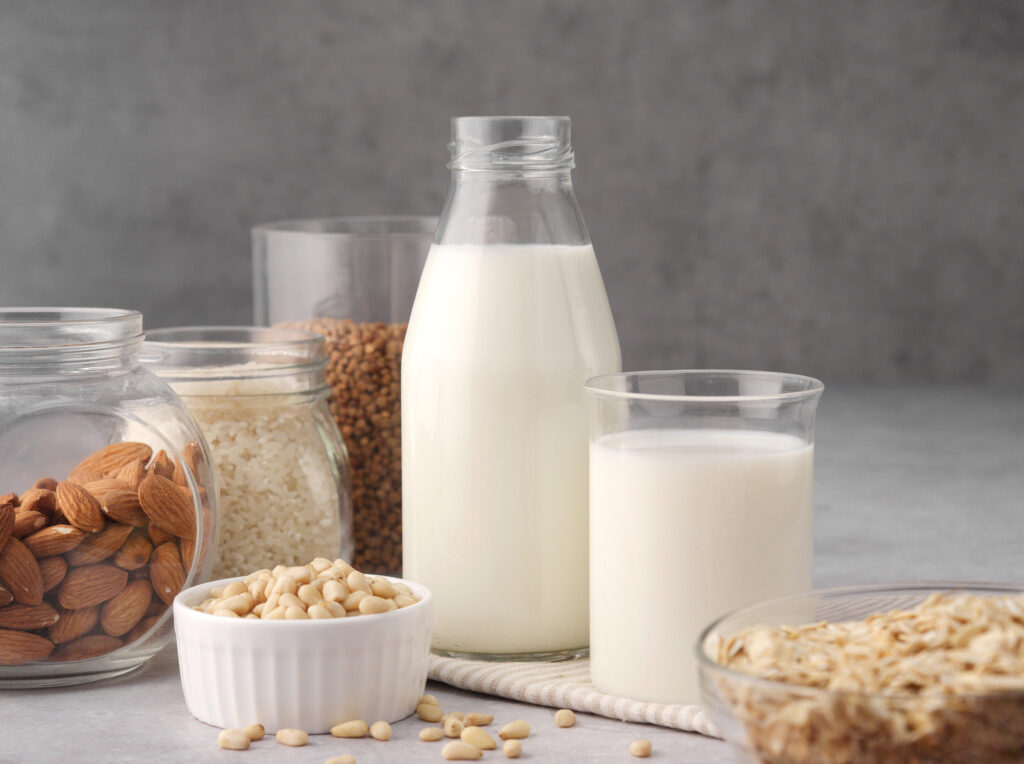Milk allergy and considerations for milk alternatives that are plant-based

In this series, we ask dietitians across Canada to answer your questions on nutrition and dietary support. We recently spoke with Ali Chernoff, a registered dietitian based in Vancouver, BC.
This month, Ali answers a question about milk allergy and considerations for milk alternatives that are plant-based.
What do I need to think about before choosing alternatives to animal-based milk products because of milk allergy?
These days, many people are looking for alternatives to animal-based milk products, due to milk allergy or other reasons. With so many products, choosing the best alternative can be daunting. Here are some things to consider and help you narrow down the options:
Range of products
Plant-based milks can be made from various sources:
| Source | Plant milk examples |
|---|---|
| Tree nuts | Almond, cashew, hazelnut |
| Grains | Oat, rice |
| Legumes | Soy, pea |
| Fruits and vegetables | Coconut, potato |
| Seeds | Flax, sesame, hemp |
Nutritional value
It is essential to ensure that the alternative you select provides the same nutritional value as regular milk. Nutrients such as calcium, vitamin D, and protein are vital for maintaining good health; everyone needs vitamin D3 from birth onward. It is best to have a variety of foods and supplement when appropriate versus relying only on milk alternatives to ensure your daily nutrition is met.
For example, soy milk is high in protein and is fortified with calcium and vitamin D. Almond milk, on the other hand, is lower in protein and needs to be fortified with these nutrients to be a worthwhile substitute.
If you choose unsweetened over original versions, you will consume less sugar and overall less calories. Pick the milk alternatives that you prefer, and ensure you are having a variation of foods in your daily meal plan.
Taste

Milk alternatives come in different flavours, textures, and tastes. Some people may find that soy milk has a bitter aftertaste, while others may prefer oat milk’s creaminess. Everyone’s taste preferences are different, so do not be afraid to experiment, try different ones, and have fun with it. You can even consider a blind taste test to see what you like best.
Price and availability
Alternatives can be more expensive than regular milk, depending on the brand and type. You may find yourself having to pay a premium for organic or specialty brands. It is also essential to consider the availability of the alternative milk you choose.
Some supermarkets may not carry a wide range of options or may only stock certain brands. However, sometimes milk alternatives are sold in tetra packs which may be less expensive than those that have to be refrigerated.
Environmentally-friendly choices

If you’re shopping with sustainability in mind, it is essential to consider the environmental impact of the milk alternative you choose. The production of almond milk, for example, requires vast amounts of water, which can be harmful to the environment. On the other hand, soy milk can be more sustainable if it is made from responsibly sourced soybeans. Oat milk has the least impact on the environment.
Food processing
Some milk alternatives involve more processing than others leading to the addition of preservatives, thickeners, and other additives. Choosing minimally processed options may be better for your health in the long run.
Use in baking and cooking

Different milk alternatives will work better for different uses, depending on consistency. For example, coconut milk is great for curries and stews while almond milk is better in baking. It is essential to consider for what you will be using the milk alternative prior to making a selection.
Key tip: Always read the list of ingredients and any “may contain” statements for milk on the alternative products you’re thinking about buying. If you have any questions, contact the manufacturer.
By taking into account some or all of these factors, you can make an informed decision and find the best milk alternative(s) for your needs, whether you have a milk allergy or buy for someone who does!
For more information on Ali, visit nutritionatitsbest.com.
Learn more
Do you have a food allergy-related question you’d like to ask a dietitian in the months to come? If so, send it along to us at info@foodallergycanada.ca. Please note: The dietitians featured in this series answer questions on general topics, please talk to your doctor if you have questions about your own health or the health of your child.
Tags: ask the dietitian, milk alternatives


